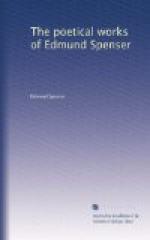And there, with humble minde and high insight,
Th’eternall Makers maiestie wee viewe,
His love, his truth, his glorie, and his might,
And mercie more than mortall men can vew.
O soveraigne Lord, O soveraigne happinesse,
515
To see thee, and thy mercie measurelesse!
Such happines have they that doo embrace
The precepts of my heavenlie discipline;
But shame and sorrow and accursed case
Have they that scorne the schoole of arts divine,
520
And banish me, which do professe the skill
To make men heavenly wise through humbled will.
However yet they mee despise and spight,
I feede on sweet contentment of my thought,
And please my selfe with mine owne self-delight,
525
In contemplation of things heavenlie wrought:
So, loathing earth, I looke up to the sky,
And being driven hence, I thether fly.
Thence I behold the miserie of men,
Which want the blis that wisedom would them breed.
And like brute beasts doo lie in loathsome den
531
Of ghostly darkenes and of gastlie dreed:
For whom I mourne, and for my selfe complaine,
And for my sisters eake whom they disdaine.
With that shee wept and waild so pityouslie,
535
As if her eyes had beene two springing wells;
And all the rest, her sorrow to supplie,
Did throw forth shrieks and cries and dreery yells.
So ended shee: and then the next in rew
Began her mournfull plaint, as doth ensew.
540
POLYHYMNIA.
A dolefull case desires a dolefull song,
Without vaine art or curious complements;
And squallid Fortune, into basenes flong,
Doth scorne the pride of wonted ornaments.
Then fittest are these ragged rimes for mee,
545
To tell my sorrowes that exceeding bee.
For the sweet numbers and melodious measures
With which I wont the winged words to tie,
And make a tunefull diapase of pleasures,
Now being let to runne at libertie
550
By those which have no skill to rule them right,
Have now quite lost their naturall delight.
Heapes of huge words uphoorded hideously,
With horrid sound, though having little sence,
They thinke to be chiefe praise of poetry;
555
And, thereby wanting due intelligence,
Have mard the face of goodly poesie,
And made a monster of their fantasie.
Whilom in ages past none might professe
But princes and high priests that secret skill;
560
The sacred lawes therein they wont expresse,
And with deepe oracles their verses fill:
Then was shee held in soveraigne dignitie,
And made the noursling of nobilitie.
But now nor prince nor priest doth her maintayne,
But suffer her prophaned for to bee
566
Of the base vulgar, that with hands uncleane
Dares to pollute her hidden mysterie;
And treadeth under foote hir holie things,
Which was the care of kesars* and of kings.
570
[* Kesars, emperors.]




